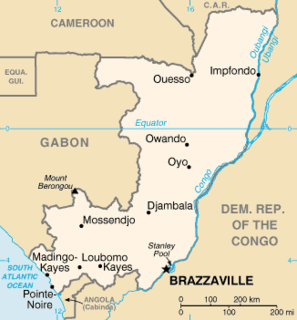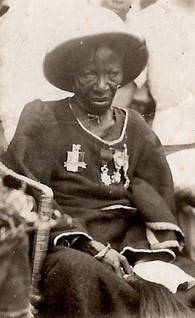
The history of the Republic of the Congo has been marked by diverse civilisations: indigenous, French and post-independence.

Marien Ngouabi was the third President of the Republic of the Congo from January 1, 1969, to March 18, 1977.

Brazzaville is the capital and largest city of the Republic of the Congo. Constituting the financial and administrative centre of the country, it is located on the north side of the Congo River, opposite Kinshasa, the capital city of the Democratic Republic of the Congo.

Pietro Paolo Savorgnan di Brazzà, later known as Pierre Paul François Camille Savorgnan de Brazza; 26 January 1852 – 14 September 1905), was an Italian-born, naturalized French explorer. With his family's financial help, he explored the Ogooué region of Central Africa, and later with the backing of the Société de Géographie de Paris, he reached far into the interior along the right bank of the Congo. His friendly manner, great charm and peaceful approach made him popular among Africans. Under French colonial rule, the capital of the Republic of the Congo was named Brazzaville after him and the name was retained by the post-colonial rulers, the only African nation to do so, except for Pretoria, South Africa; Port Louis, Mauritius; and Victoria, Seychelles.

The French Congo or Middle Congo was a French colony which at one time comprised the present-day area of the Republic of the Congo and parts of Gabon, and the Central African Republic. In 1910, it was made part of the larger French Equatorial Africa.

The Teke people or Bateke, also known as the Tyo or Tio, are a Bantu Central African ethnic group that speak the Teke languages and that mainly inhabit the south, north, and center of the Republic of the Congo, the west of the Democratic Republic of the Congo, with a minority in the south-east of Gabon. Omar Bongo, who was President of Gabon in the late 20th century, was a Teke.
André Grenard Matswa was a Congolese Lari religious figure and politician born near Manzakala-Kinkala in then Middle Congo, a rare influential figure in Congolese politics before independence in 1960. He inspired a messianic cult, Matswanism or Matsuanism, that emerged in the French Equatorial African capital, Brazzaville.

Malamine Camara was a Senegalese sergeant in the French colonial army, and a key figure in the extension of French colonial rule in the Congo Basin.

The Republic of the Congo, also known as Congo-Brazzaville, the Congo Republic or simply either Congo or the Congo, is a country located in the western coast of Central Africa to the west of the Congo river. The country is bordered to the west by Gabon, to its northwest by Cameroon and its northeast by the Central African Republic, to the southeast by the Democratic Republic of the Congo, to its south by the Angolan exclave of Cabinda and to its southwest by the Atlantic Ocean. French is the official language of the Republic of the Congo.
Claude-Ernest Ndalla is a Congolese politician. First coming to prominence as a radical youth leader in 1960s Congo-Brazzaville, he was one of the leading members of the Congolese Labour Party (PCT) in the period immediately following its founding in 1969, but after a few years his career fell into a long decline due to factional struggles within the PCT. Later, he served in the government of Congo-Brazzaville as Minister of Youth Redeployment and Sports from 1997 to 1999, and he has been a Special Adviser to President Denis Sassou Nguesso since 2003.

La Sape, an abbreviation based on the phrase Société des Ambianceurs et des Personnes Élégantes and hinting to the French slang word sape which means "clothes" or sapé, which means "dressed up", is a subculture centered on the cities of Kinshasa and Brazzaville in the Democratic Republic of the Congo and Republic of Congo respectively. An adherent of La Sape is known as a sapeur or, if female, as a sapeuse. The movement embodies the elegance in style and manners of colonial predecessor dandies.
Plot For Peace is a 2013 South African documentary directed by Carlos Agulló and Mandy Jacobson.
The African nation of Gabon has had human inhabitants for perhaps 400,000 years. Bantu peoples settled here from the 11th century. The coastline first became known to Europeans through Portuguese and Dutch sailors. Colonised by the French in the 19th century, Gabon became independent in 1960.
The following is a timeline of the history of the city of Brazzaville, Republic of the Congo.

Aloïse Moudileno-Massengo was the first Congolese lawyer in France. He later became a minister in the Republic of the Congo under Alphonse Massamba-Débat and then Marien Ngouabi, as well as serving as Vice-President of the Republic of the Congo.

Idanna Pucci is an Italian writer and documentary filmmaker, and a member of the prominent Pucci family of Florence.

The Bouenza River is a river of the Republic of the Congo. It is a right tributary of the Niari River. It feeds the Moukoukoulou Hydroelectric Power Plant.

Ngalifourou was a queen of the Mbé region in what is today the Republic of Congo(Congo-Brazzaville). As a ruler she was close to French colonial authorities and was the first ruler in her region to sign a treaty with them. An important spiritual figure, as well as a royal one, her funeral was used as a tool by the French regime to try and resist its decline.

Terence S. Ward is an Irish-American writer and film producer.
Matswanism is a political association that was founded in French Congo by André Matswa in the 1920s and evolved into a religious/political movement after the death of Matswa in 1942.














